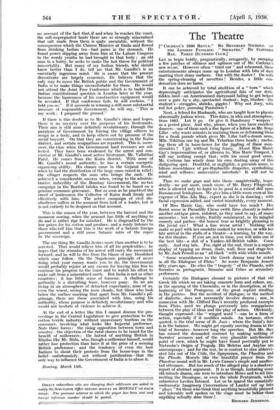The Theatre
rot COCHRAN'S 1980 REVUE." BY BEVERLEY NICHOLS. AT THE LONDON PAVILION. " SOCRATES." By CLIFFORD BAX. THREE HUNDRED CLUB.] LET us begin boldly, pragmatically, arrogantly, by sweeping a few patches of silliness and ugliness out of Mr. Cochran's new revue: However often " tried out " and rehearsed, these entertainments always come up to London with bits of dust marring their shiny surfaces. Out with the duster ! On with the spring-cleaning of novelties ! Besides, a little con- densation does no 'harm.
It can be achieved by total abolition of a " turn " which depressingly anticipates the agricultural fate of our debt- ridden land—an Americanized dairymaid failing to get helped over a gate by a shy, spectacled student : legs, blushes—the student's—struggles, shrieks, giggles ! Why not Joey, with red hot poker, pursuing Pantaloon ?
Next, a School for Husbands, who are taught how to placate abnormally jealous wives. This dates, in idea and atmosphere, from 1865. Let it go. Or give it Dundreary " weepers " as a period piece. And why, please, when you have excellent dancers—one of them such a fine figure of a fellow as Mr. Serge Lifar—why waste minutes in maiming them or deforming them for a 'freak parade which gives Mr. Lifar half-a-dozen arms, Mlle. Nikitina one leg and Mr. Teherkas three heads ; enclos- ing them all in loose-boxes for the jiggling of these mon- strosities ? Ugly without being funny. About Miss Maisie Gay's impersonation of, or allusion to, Miss Marie Tempest, I will say nothing except that, with his usual good sense, Mr. Cochran has wisely done his own dusting away of this disfiguring spot. Doubtful, or negligible, a greenish scene, in bilious resemblance of pre-Raphaelite draperies, symbolizing wind and willows: uninventive interlude! It will not be missed.
Thus we make gaps and into them—magisterially, impu- dently—we put more, much more, of Mr. Barry Fitzgerald, who is allowed only to begin to be good in a mixed skit upon Russian and Irish gloom. We give him a little room even at the expense of Miss Ada May, expert as she is in dancing ; with facial expression added, and varied inimitably, every moment.
Of Miss Maisie Gay, who could have too much ? Her florist scene in Piccadilly Circus (with Bros absent) is indeed another antique piece, redolent, as they used to say, of many memories ; but so richly, fruitily reminiscent, in its mingled comedy and pathos—the honest tear so brightly gleaming in the jovial eye ! What a fine revue artist ! Nothing will make us part with her omelette cooked by wireless, or with her late arrival in the stalls of a theatre—a warning, by the way, for this theatre. If you are not in time, you will miss one of the best bits—a skit of a Yankee-All-British talkie. Come early. And stay late. For, right at the end, there isn superb display of tapping on drum, chair, wall, floor and stage-box by Mr. Jack Powell as an " all black " with wide white mouth.
" Sorne resemblances to the Greek drama may be noted in all the .Dialogues of Plato." So wrote Benjamin Jowett fifty years ago. He cites the " tragedy" of the Phaedo, with Socrates as protagonist, Simmias and Cebes as secondary performers.
Certainly the Dialogues abound in pictures of that old Greek life which we see taking concrete form and colour, say, in the opening of the Charmides, or in the description, at the beginning of the Protagoras, of the great sophist strolling in the portico. But the accident of dialogue, or the method of dialectic, does not necessarily involve drama • nor, in connexion with Mr. Clifford Bax's recently produced excerpts from Plato, need we plunge perVersely into comparisons between the play of ideas and the-play of action. Obynnisly; thought expressed—the " winged word "—can be a form of action, especially if it modifies minds. An instance, often quoted, is the trial scene of St. Joan : where the Saint's fate is in the balance. We might get equally moving drains in the trial of Socrates—however long the speeches. But Mr. Bax has missed the demanded contrast by making nothing of Socrates' accusers and of the very plausible anti-Socratic point of view, which he might have found poetically put in Nietzsche's Origin of Tragedy. His Meletus and Anytus are nincompoops ; and for the rest, he is content to slice abbrevi- ated bits out of the Crito, the Symposium, the Phaedrus and the Phaedo. Moisels like the beautiful prayer from the Phaedrus sound well in Mr. Lewis Casson's simple and unaffec- ted utterance. But too much of the alleged play is a shadowy report of abstract argument. It is as though, imitating some old miracle drama, one were to introduce Moses and to set him reciting the. Decalogue, or even the whole Pentateuch, while submissive Levites listened. Let us be spared the essentially undramatic Imaginary Conversations of Landor cut- up into " plays "for those who think that anything beautifully phrased and tolerably well spoken on the stage must be better than anything actually done there
RICHARD JENNINGS.










































 Previous page
Previous page